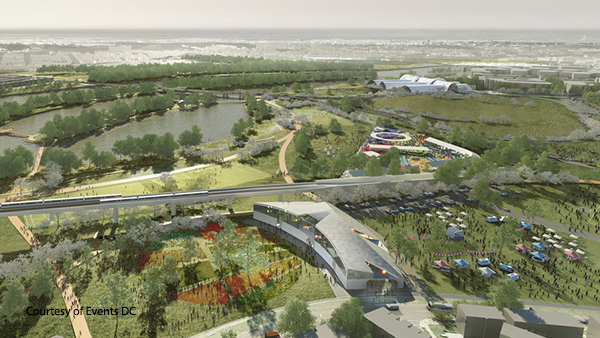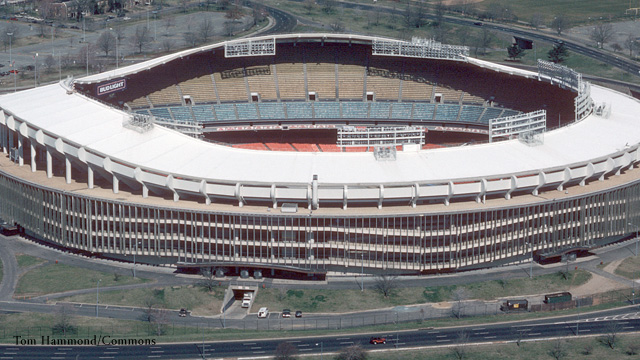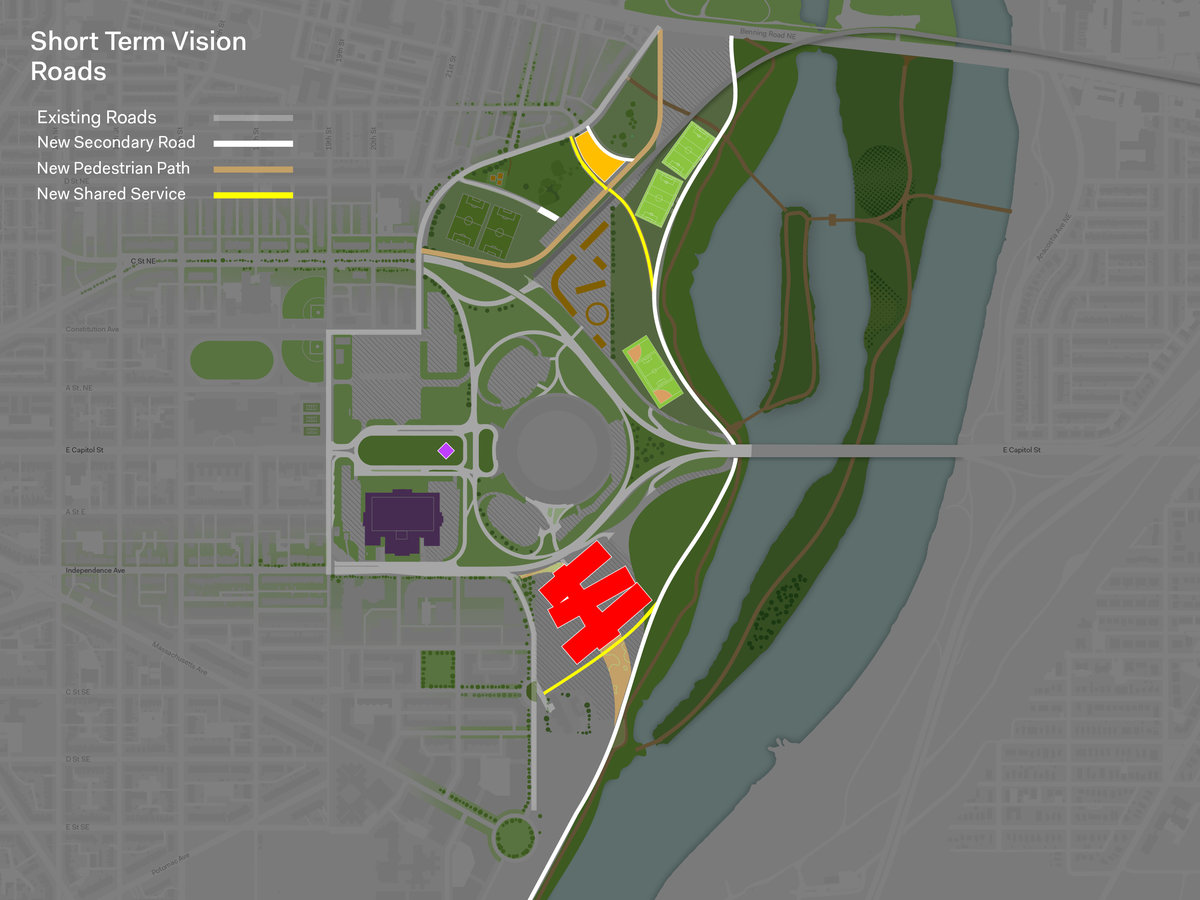Huge sports complex proposed for RFK site, including new soccer fields

Soccer fields featured prominently as Events DC, the city organization that operates RFK Stadium and the adjacent D.C. Armory, unveiled a sweeping proposal for the future use of the 190-acre riverside complex on Thursday night.
Roughly estimated to cost a head-turning $490 million, the concept includes three multi-purpose athletic fields – all three slated for soccer and one to be shared with baseball – as well as a 47,000-square-foot food market hall and a 350,000-square-foot indoor sports complex that would play home to a range of activities from indoor soccer to basketball to bowling to batting cages. The plan also includes a memorial to Robert F. Kennedy and three pedestrian bridges to the Kingman and Heritage Islands in the Anacostia River, connecting the site to the neighborhoods on the river’s east bank.
The sports complex would be a sweeping 315,000 square feet in size, 217,000 square feet of it outdoor playing fields. The visualizations released on Thursday suggest that the existing RFK Auxiliary Fields, the two soccer fields where D.C. United’s teams currently train, would remain, though it’s unclear under whose control. Events DC officials said they could put the proposal into effect in two to five years and it would not hinge on whether RFK itself is torn down.
+READ: Dougherty: Random thoughts during a D.C. United game at RFK Stadium
City officials have for months been holding public meetings with residents of the neighborhoods near RFK to gain input on community needs and preferences for the site, which is presently dominated by the poorly-aging 55-year-old stadium and the acres of surface parking lots that surround it.
 D.C. United’s new stadium at Buzzard Point is (nearly) under construction and expected to be ready for use in late 2018 or 2019, after which point RFK is expected to fall into near-complete disuse.
D.C. United’s new stadium at Buzzard Point is (nearly) under construction and expected to be ready for use in late 2018 or 2019, after which point RFK is expected to fall into near-complete disuse.
The local NFL team has expressed interest in building a massive new stadium on the site, while Capitals and Wizards owner Ted Leonsis has spoken in similar terms of moving his teams from the Verizon Center in the Chinatown neighborhood at some point in the future.
But with the NFL team still a decade away from escaping its lease at FedEx Field and the Verizon Center showing little need for replacement, those concepts remain distant possibilities. Meanwhile, the rapid population growth – and increasing land costs – of the city and its surrounding suburbs have left the region with a chronic shortage of field space for youth and adult sports alike.
Turning RFK’s northern lots into sports fields is an idea that dates back to 2012, when local residents formed the Capitol Riverside Youth Sports Park (CRYSP) organization and began to lobby politicians and local stakeholders.
+READ: D.C. United stadium project inches forward as city spends $25 million on land acquisition
The new Events DC proposal reflects a focus on “what can we do now in the next two to five years on this site to capture the economic development that has been happening in the city,” said Events DC chair Max Brown. “We’ve heard a lot from the community that there are just not enough fields. There aren’t enough fields. Scheduling fields is just an impossible task.”
The RFK site is owned by the federal government under the domain of the National Parks Service, but leased to the District of Columbia for “recreational facilities, open spaces, or public outdoor recreation opportunities” in a long-term arrangement that expires in 2026. Working around those restrictions presents the city with a knotty task.
 “Events DC would have to either wrest control of the site from the park service or seek congressional approval for a change or extension that would allow the financing of the plan’s larger elements, such as the sports complex,” writes the Washington Post‘s Jonathan O’Connell.
“Events DC would have to either wrest control of the site from the park service or seek congressional approval for a change or extension that would allow the financing of the plan’s larger elements, such as the sports complex,” writes the Washington Post‘s Jonathan O’Connell.
“Myriad government agencies including the National Capital Planning Commission and the U.S. Army Corps of Engineers would have to approve the plans, and the D.C. Council would have to approve contracts of at least $1 million related to the work.”
On Thursday Events DC stated that half of the proposal’s projected $489.6 million cost ($239.9 million) would come from its own budget, which is funded mostly by hotel and restaurant taxes. Another $83.2 million would come directly from the D.C. government and the rest – $166 million – would be raised from private sources.
+FIND more coverage of the proposal, including a slideshow of renderings, at DCist.com











